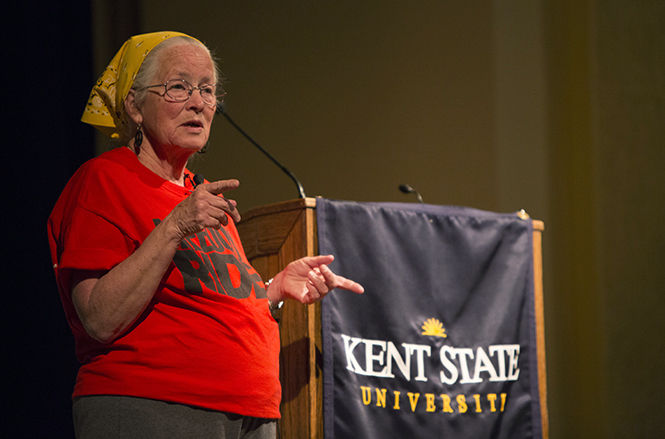Freedom Rider recounts fight against segregation
Freedom Rider Joan Mulholland speaking to an audience at the KIVA. Mulholland and her son, Loki (not pictured) spoke about her time as a Freedom Rider during the American Civil Rights movement. March 9, 2015.
A Freedom Rider who participated in the civil rights movement in the 1960s, Joan Mulholland, spoke about her experiences in the Kiva Monday night.
The Freedom Riders took many bus trips throughout the South to protest segregation.
Mulholland not only spoke of her memories during the Civil Rights movement but also gave advice to the audience.
“You have to figure out what issues are more important to you on your campus,” Mulholland said. “The power of nonviolence: it speaks to people.”
All it takes is the individual and the individual’s allies to practice conformity to make a difference, she said.
Mulholland participated in many civil rights movements, including the sit-in at Greensboro, North Carolina; in the Woolworth’s lunch counter; the Selma to Montgomery march, and three dozen other protests and sit-ins.
She also recounted her experience of getting arrested for being part of the Freedom Riders and being sent to Mississippi’s Parchman Penitentiary on death row after spending two months with the Freedom Riders.
After being arrested, she transferred from Duke University to Tougaloo Southern Christian College, where she became the first white woman to be a member of Tougaloo’s predominately African-American chapter of the Delta Sigma Theta sorority.
Mulholland said she remembers both the good and bad times, including when her and other Freedom Riders were attacked for standing up to segregation.
Mulholland’s favorite memory came at 10 years old, when she walked through the side of town in which she described as “the colored part.” She said at that moment she realized something wasn’t right, which inspired her to do something about it.
Her son, Loki, who was also present Monday night, created the documentary, “An Ordinary Hero,” which features his mother and her experiences in the Civil Rights movement.
“My mom was just mom to me as a kid,” Loki said. “When I grew up and learned about the history of the Civil Rights movement, I never knew my mom was such an avid participant during this time.”
Loki said his experiences of not knowing about his mom and then learning about what she had done gave him inspiration to make the documentary.
“It was really cool to think about all the history and events she went through,” said Kaitlyn Setton freshman exploratory major . “She was really big on talking about standing up for what’s right, which got me thinking that I should be doing that more.”
Her advice not only reached out to Setton, but also to Emily Dodd, another freshman exploratory major.
“My favorite part was when she talked about the Ku Klux Klan surrounding her car and she was just so calm about it because she had so much faith that if they died standing up for what they believed in, they will still be ok,” Dodd said. “I was just really inspired by that because she was going through something that was so unbelievable and so difficult but she still had the faith that everything was going to be okay in the end.”
Contact Lydia Taylor at [email protected].



